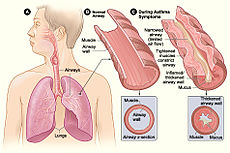
Back Asma Afrikaans Asma AN ربو Arabic ربو ARZ হাঁপানি Assamese Asma AST दमा AWA Bronxial astma Azerbaijani آسم AZB Ҡурылдай астмаһы Bashkir
| Asthma | |
|---|---|
| Classification and external resources | |
 An asthma attack causes the airways to tighten and causes too much mucus to be made. This makes it hard to breathe. | |
| ICD-10 | J45. |
| ICD-9 | 493 |
| OMIM | 600807 |
| DiseasesDB | 1006 |
| MedlinePlus | 000141 |
| eMedicine | article/806890 |
| MeSH | D001249 |
Asthma (or Asthma bronchiale) is an obstructive lung disease which affect the airways inside the lungs. It has generally been accepted as an inflammatory disease[verification needed]. Asthmatics are affected in three ways by asthma, explained in this section. It causes the tissue inside the airways to swell. Asthma also causes the bands of muscle around the airways to become narrow. This makes it hard for enough air to pass through and for the person to breathe normally. The third is that it also causes mucus-making cells inside the airways to make more mucus than normal. This blocks the airways, which are already very narrow during an asthma attack, and makes it even more difficult to breathe.
A person having an asthma attack often makes wheezing sounds when trying to breathe. This is the sound of air trying to pass through the very narrow airway. They also have shortness of breath, which means they cannot take a full, deep breath. Chest tightness may happen which feels like their chest is being squeezed. They may also cough a lot.
All asthma attacks can be a medical emergency because they can be fatal (cause a person to die). There is no cure for asthma. Especially dangerous attacks are called severe. There are also more severe attacks than that, the most severe, called life-threatening attacks.
There are treatments, such as different kinds of medicines to help people with asthma. There are also things that people with asthma can do to help themselves to keep their asthma from getting worse. Childhood (like in adolescents) asthma usually gets mostly better on its own with age.
A person may have asthma or COPD, but not both. COPD is generally a higher risk or more likely condition in people who are over 35. There are a lot of risk factors for getting asthma. The exact reasons for each is not yet clearly understood. Some of the factors are believed to come from genetics. A person inherits genetic mutations from one or both of their parents that may increase the chances of developing asthma. Epigenetics, which are changes in the way a gene acts, may also increase their chances of getting asthma. These epigenetic changes may also be inherited. They may happen when a baby is still growing inside its mother, or during childhood.
Socioeconomic status (SES) is also believed to play a part in developing asthma. A person's socioeconomic status is based on such things as how much money their family makes, where they live, and their education level. Race and ethnicity also may play a part. It also is related to access to medical care, personal beliefs, and dietary habits. People of lower socioeconomic status suffer higher rates of asthma, have worse outcomes, and also have higher asthma-related death rates than people of higher economic status.